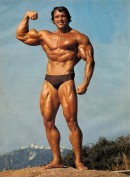 I feel like the delays in release (not to mention the austerity of the source material) don’t bode well for the movie adaptation of Cormac McCarthy’s The Road
I feel like the delays in release (not to mention the austerity of the source material) don’t bode well for the movie adaptation of Cormac McCarthy’s The Road, but here’s the official trailer. . . . Speaking of which, The Millions takes a look at books made into movies, including a few of those rarities, movies that improved on the book. . . . In the Los Angeles Times, Richard Rayner points out (and recommends) a book I didn’t know existed, an early novel by Michael Ondaatje called The Collected Works of Billy the Kid
. (”The writing throughout is sensuous, violent, visceral, never static, summoning a lost world with imagination and language that flash like lightning. . . . [The novel] already feels like a modern classic.”) . . . John Self appreciates Melville’s Bartleby, which, “like all classics, defies expectations, and expands before your very eyes.” . . . This profile of Clive James is worth reading for three reasons: 1) It’s a profile of Clive James; 2) it implies that there is video available, somewhere, of James interviewing the Spice Girls; and 3) it reveals that James once described Arnold Schwarzenegger as “a brown condom full of walnuts.” Wow.
Archives, May, 2009
Thursday, May 28th, 2009
In the Ether
Wednesday, May 27th, 2009
The Pit & . . . the Pit
A continuing series that highlights books recently acquired by publishing houses for future release. Each post features a book we’re looking forward to, and a book we’re . . . not.
No easily identifiable cherries this week, so we’ll focus on two pits instead. Just the bio of the first one’s author gave me a headache:
Founding member of Twitter, founder of iPhoneDevCamp and DollarApp, and developer of the official Obama ‘08 campaign iPhone app, Dominic Sagolla’s 140 Characters: Style Guide for the Short Form, an Elements of Style for the digital age, with a foreword by Twitter Chairman and Co-Founder, Jack Dorsey.
And:
Shannen Doherty’s Bad Ass, sharing the author’s very personal journey from bad girl to a bad ass, with topics ranging from decorating and entertaining to charm and dating.
Wednesday, May 27th, 2009
This Post Will Make You Dumber
Unfortunately, a couple of today’s posts will come from the Death of Literacy Department. First, I present Mr. Kanye West, and his 52-page, spiral-bound, co-written opus Thank You and You’re Welcome.
As one news report puts it:
Rapper Kanye West does not read books or respect them but nevertheless he has written one that he would like you to buy and read.
One entire page contains nothing more than this gem: “I hate the word hate!”
Take it away, Kanye:
“Sometimes people write novels and they just be so wordy and so self-absorbed. I am not a fan of books. I would never want a book’s autograph. . . . I am a proud non-reader of books. I like to get information from doing stuff like actually talking to people and living real life.”
Tuesday, May 26th, 2009
The Beat
A weekly roundup of noteworthy reviews from other sources.
 Robert Sullivan reviews Mannahatta, “more art book than typical natural history tome,” which uses computer-generated imagery to recapture the way New York City looked before it was conquered by concrete
Robert Sullivan reviews Mannahatta, “more art book than typical natural history tome,” which uses computer-generated imagery to recapture the way New York City looked before it was conquered by concrete. . . . Richard Holmes reviews several books by and about Madame de Staël, who Lord Byron called “the first female writer of this, or perhaps any age.” . . . Taylor Antrim admits that the 40-ish American woman finding adventure in Italy is hardly a plot hot off the presses, but he says that Binnie Kirshenbaum’s The Scenic Route
is a “clever, offbeat novel . . . [that] is an antidote to all that soft-focus sentiment.” . . . John Lanchester on three recent books about finance. . . . Stephen Cave recommends Terry Eagleton’s latest, with reservations. (“Suggesting that [Richard] Dawkins must digest two millennia of theology before taking a view on the existence of God is like suggesting he must do a PhD in witchcraft before judging whether Harry Potter is a work of fiction.”)
Tuesday, May 26th, 2009
The Evolution of a Bad Idea
If you haven’t seen it yet, take some time this week to read William Deresiewicz’s review for The Nation of several books about “literary Darwinism.” As he explains near the top, “The nascent field of Darwinian aesthetics seeks to account for the art-making impulse in evolutionary psychological terms. If art is a product of the mind, and the mind is a product of evolution, then art is a product of evolution.” This reminded me of reading Darwin’s Dangerous Idea by Daniel Dennett several years ago. Terrific book, but it truly lost me (and infuriated me) when it started trying to apply Darwinism to the cultural survival of certain works of art.
Among other one-liners, Deresiewicz calls evolutionary psychology “the Malcolm Gladwell of science: facile and glib, but so persuasive and charming that no one wants to ruin the fun.” It’s a smart, lengthy piece about why we should resist replacing Theory (about which he also has strong feelings) with a Darwinian approach, why it “really would be the death of humanism, not to mention the English major,” and why “the finest books demand a criticism that attends to what makes them unique, not what makes them typical.”
Friday, May 22nd, 2009
Anti-Blurb 4
Choire Sicha reviewing Bergdorf Blondes by Plum Sykes in 2004:
Bergdorf Blondes should inspire readers everywhere to rise up and rip one another limbless. . . . In all seriousness: we must build a tiny apocalypse-proof time capsule. If we can resist the temptation to burn Plum Sykes’s book, we can smuggle it into the future. Perhaps the next breed of humanoids can learn from the holocaust of culture and commerce that destroyed our icky civilization. . . . If you have any sense of justice at all, the publication of this book demands that you rouse yourself from the couch this very second and set out to loot and burn Manhattan.
(Of course, Sicha, given his history at Gawker, is not one to talk about the holocaust of culture, but hey…)
Thursday, May 21st, 2009
In the Ether
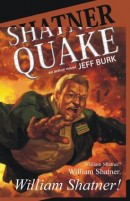 An early candidate for the 2009 Pulitzer in fiction: the 100-page Shatnerquake
An early candidate for the 2009 Pulitzer in fiction: the 100-page Shatnerquake. I’ll let the promotional copy do the heavy lifting here: “It’s the first ShatnerCon with William Shatner as the guest of honor! But after a failed terrorist attack by Campbellians, a crazy terrorist cult that worships Bruce Campbell, all of the characters ever played by William Shatner are suddenly sucked into our world. Their mission: hunt down and destroy the real William Shatner.” . . . On a lighter note, Levi Stahl has been on an entertaining roll with posts about Wordsworth, Coleridge, and their circle. . . . Like me, Tom Nissley was fascinated by a recent story about Jack Kerouac’s obsessive creation (in full adulthood) of make-believe baseball leagues and horse races. . . . I find it hard to believe that Flannery O’Connor’s Wise Blood
could be turned into an effective movie, but the Criterion Collection just released John Huston’s adaptation and Anne Yoder writes an appreciation of it (and its source material). . . . I lean Luddite myself, but it’s hard to argue with this: “if this isn’t an argument for the Kindle, I don’t know what is.”
Tuesday, May 19th, 2009
Lewis on Buffett
I mentioned a review of Michael Lewis’ latest in yesterday’s Beat roundup, only to realize soon after that Lewis himself has a review worth reading this week — of a new book about Warren Buffett. Here’s how Lewis starts:
There is now a long shelf of books about Warren Buffett, but this is the first time he has gone to any trouble to add to it. Reportedly Buffett now regrets his decision–he has apparently put some fresh distance between himself and his official biographer. If so, it’s not hard to see why. Alice Schroeder is a former Morgan Stanley research analyst, able to understand and to explain Buffett’s money-making, but she declined to confine herself to the business at hand. She has sought to describe Buffett’s psychological landscape as clearly as his financial one. For the reader, the results are pretty terrific–there are not a lot of 838-page narratives that leave you wanting more–but for Buffett they are no doubt upsetting.
Monday, May 18th, 2009
The Cherry & the Pit
A continuing series that highlights books recently acquired by publishing houses for future release. Each post features a book we’re looking forward to, and a book we’re . . . not.
The Cherry:
Jason Fagone’s The Dream Shot, a narrative account of maverick scientist Stephen Hoffman’s crusade to eradicate malaria, offering an intimate look at the grim effects of the disease, the process of scientific invention, the unseen rituals of billion-dollar philanthropy, and the David vs. Goliath battle between a small startup and Big Pharma to come up with a vaccine that will save a million lives each year.
The Pit:
Kim Marcille’s The Science of Making Things Happen, showing how the principles of quantum physics can be used to consciously manipulate the flow of energy, shift matter, and alter our circumstances to create the life of our dreams.
Monday, May 18th, 2009
The Beat
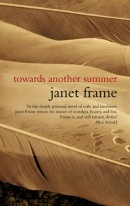 The lead review in this week’s roundup is David Gates’ stirring examination of Towards Another Summer
The lead review in this week’s roundup is David Gates’ stirring examination of Towards Another Summer, a novel by Janet Frame. Unpublished during her lifetime, it’s now available five years after her death. I was unaware of Frame, but Gates sent me looking for more information. He writes that, like Sylvia Plath, her “sanity became, and continues to be, the subject of tedious and condescending debate,” and that Towards Another Summer “has aged better than [The Bell Jar].” Whether Frame and her book interest you or not, Gates’ review is worth reading on its own merits. . . . I knew that Michael Lewis’ latest book, on fatherhood, was essentially a collection of pieces he’d written for Slate. Toby Young seems not to have known before he sat down to review it, so he was initially surprised that there isn’t much “intellectual meat” on the bones of “an endless series of [funny] set pieces.” Here’s this week’s line that sounds dirty but isn’t: I’d rather read Lewis’ bones than most people’s meat. . . . Bryan Appleyard with a funny review of two books about the first moon landing. . . . Yet another look at Samuel Beckett’s correspondence, this one by John Banville. . . . From Canada, a review of a book about hockey great Maurice Richard. The review begins with William Faulkner at a New York Rangers game. Seriously.
Friday, May 15th, 2009
Year-Round Madness
 In a world of terrible sequels, here, refreshingly, is a great one: The Final Four of Everything
In a world of terrible sequels, here, refreshingly, is a great one: The Final Four of Everything. It’s a follow-up to The Enlightened Bracketologist
. In both books, the national frenzy for brackets inspired by March Madness is put to use in settling (and starting) debates about everything from the best presidential speeches to the best breakfast cereal. The format is simple: Take 32 of anything, pit them against each other in a tournament-style bracket and see who or what is left standing.
In the new book, Second Pass contributor (and excellent saxophone player) Nick Trautwein considers the best jazz solos. Luke Dempsey — obsessive bird watcher, author of A Supremely Bad Idea, and another friend to this site — designs a tournament for . . . birds.
Other subjects among the book’s 150 include Supreme Court decisions, the worst movies by great directors, high school movies (criminally, Ferris Bueller and The Breakfast Club are made to meet in the second round, meaning one of them goes home way too early), sitcom dads and sitcom moms (teaser: one Huxtable comes out on top; the other doesn’t), and impressionists (not the painters, but people like Dana Carvey and Robin Williams. The finals of that one rightfully pits Frank Caliendo against Darrell Hammond. If you haven’t seen Hammond’s German-language Phil Donahue, you haven’t lived.)
One of the funniest concepts comes from cartoonist Roz Chast, who tries to determine an ultimate champion among her fears and phobias. Her final four: Going blind, plane crash, cancer, and — balloons.
There’s a blank bracket in the back, so I’ll have to come up with a subject of my own and fill it out. Perhaps R.E.M. songs, or contemporary novels, or obscure 1980s baseball players. Come to think of it, I might need to make some copies of the blank . . .
Friday, May 15th, 2009
Icebreaker
The opening sentence of Breakfast of Champions by Kurt Vonnegut:
This is a tale of a meeting of two lonesome, skinny, fairly old white men on a planet which was dying fast.
(The new issue of Harper’s includes a story by Vonnegut called “Little Drops of Water.” It’s part of a collection of his previously unpublished stories, Look at the Birdie, which is due out in the fall.)
Thursday, May 14th, 2009
In the Ether
A bit about E.L. Doctorow’s next novel, out this fall. . . . Also coming this fall: an unauthorized sequel to The Catcher in the Rye. Though, how serious an enterprise it is remains an open question. . . . An Australian book cover to treasure. . . . Leslie Gelb with a dispatch from a book tour, about, among other things, the commercial benefits to being wrong. . . . You’ve probably heard already, but the first Must-Miss book of next year has been signed up.
Wednesday, May 13th, 2009
Gottlieb on God (and the Lack Thereof)
The Browser, a terrific aggregation site (or “intelligent general reader,” as it bills itself), has started a series about books. Recently, Anthony Gottlieb, the author of The Dream of Reason: A History of Philosophy from the Greeks to the Renaissance, spoke to the site about books that “weigh religion and secularism.” The interview covers five books, one of which Gottlieb calls “arguably the masterpiece of English language philosophy.”
And there’s this, on Spinoza:
. . . he was generally thought of as an atheist, though he certainly wouldn’t have described himself as one. He thought he was just trying to show what God was really like, and in fact the German poet Novalis called him a “God-intoxicated man,” with some justice, because Spinoza never stops talking about God. Well, you can’t be both God-intoxicated and an atheist. But you can, of course, be both God-intoxicated and yet unimpressed by traditional Judaism.
Tuesday, May 12th, 2009
“Fate has done its worst.”
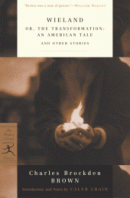 On the Backlist today, Anne Trubek examines a true oddball in American literature, Charles Brockden Brown’s Wieland. I was assigned to read it in college, but have only vague memories of it — it’s probable that, like Trubek, I didn’t make it through back then. I’m eager to now.
On the Backlist today, Anne Trubek examines a true oddball in American literature, Charles Brockden Brown’s Wieland. I was assigned to read it in college, but have only vague memories of it — it’s probable that, like Trubek, I didn’t make it through back then. I’m eager to now.
Here are the book’s opening two paragraphs:
I feel little reluctance in complying with your request. You know not fully the cause of my sorrows. You are a stranger to the depth of my distresses. Hence your efforts at consolation must necessarily fail. Yet the tale that I am going to tell is not intended as a claim upon your sympathy. In the midst of my despair, I do not disdain to contribute what little I can to the benefit of mankind. I acknowledge your right to be informed of the events that have lately happened in my family. Make what use of the tale you shall think proper. If it be communicated to the world, it will inculcate the duty of avoiding deceit. It will exemplify the force of early impressions, and show the immeasurable evils that flow from an erroneous or imperfect discipline.
My state is not destitute of tranquillity. The sentiment that dictates my feelings is not hope. Futurity has no power over my thoughts. To all that is to come I am perfectly indifferent. With regard to myself, I have nothing more to fear. Fate has done its worst. Henceforth, I am callous to misfortune.
Monday, May 11th, 2009
The Beat
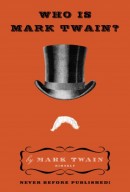 Maud Newton, Mark Twain fan nonpareil, reviews a collection of the author’s previously unpublished writings. . . . Andrew Sullivan admires Robert Wright’s forthcoming The Evolution of God
Maud Newton, Mark Twain fan nonpareil, reviews a collection of the author’s previously unpublished writings. . . . Andrew Sullivan admires Robert Wright’s forthcoming The Evolution of God. (While we’re on the subject of evolution, the Times’ mug shot of Sullivan is in serious need of updating.) . . . Lingering on the subject just a bit longer, here’s Richard Lewontin on the “immense outpouring of Darwinalia” upon the 150th anniversary of On the Origin of Species. . . . Bryan Burrough reviews two new books about Bonnie and Clyde, “as rancid a pair of ne’er-do-wells” as America has ever celebrated. . . . Colm Tóibín examines the correspondence and friendship between Elizabeth Bishop and Robert Lowell. . . . A look at how Branch Rickey attempted to start a new professional baseball league in the 1950s.
Monday, May 11th, 2009
The Cherry & the Pit
A continuing series that highlights books recently acquired by publishing houses for future release. Each post features a book we’re looking forward to, and a book we’re . . . not. (This week’s Pit is almost too horrifying to read in one sitting. Its bold italics are mine.)
The Cherry:
David Thomson’s Let There Be Light: Filming the Twentieth Century, the story of the past hundred years through the movies and how motion pictures and their makers were shaped by the era’s cultural, political, and aesthetic movements, and how movies both reflected and influenced the very century that saw the birth of its defining — and most popular — art form.
The Pit:
Glenn Beck’s multi-title co-publishing deal, covering an unlimited number of titles over an undisclosed term, beginning with Arguing with Idiots, from Threshold Editions in September 2009, America’s March to Socialism, an audio original for publication in May 2009, and Glenn Beck’s Common Sense, “channeling the spirit of Thomas Paine,” for publication as an eBook original and then a trade paperback original, in June 2009, also to include picture books and fiction for children and YA books.
What, no Thai cookbook? No Spanish translation of The Lord of the Rings? One hopes that Glenn will helpfully explain in one of these tomes how any socialist system could include such a grossly padded book deal.
Friday, May 8th, 2009
In the Ether
Speaking of Denis Johnson, the Book Design Review points out that his new novel has a couple of hidden treats. . . . UK blogger (and book publisher) Scott Pack has been reviewing a series of short books called the Great Little Reads series — “dinky paperbacks designed to be read in just one or two sittings.” He makes this one sound pretty good. . . . Here’s a real wormhole for design fans: A large gallery of Penguin’s classic science fiction designs. But that’s not all. There’s also a series of 16 essays about them, including a feature that allows you to see how a book’s design changed over the course of several editions. . . . Malcolm Pryce lists his 10 best expatriate books; part of the Guardian’s Top 10s series, which is worth a dig through the archives.
Thursday, May 7th, 2009
Angels by Denis Johnson
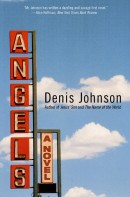 Starting here, I’ll occasionally recommend older books on the blog, in a form somewhere between what you see on The Shelf and The Backlist.
Starting here, I’ll occasionally recommend older books on the blog, in a form somewhere between what you see on The Shelf and The Backlist.
Denis Johnson is perhaps best loved by readers for his 1992 collection of clipped, hallucinatory druggie stories Jesus’ Son. He won the National Book Award in 2007 for Tree of Smoke
, an epic novel set against the Vietnam War. And his latest, a slender homage to noir called Nobody Move
has been getting praise.
My favorite book of his is his first novel, Angels, published in 1983. It’s one of the most original novels I’ve read, poetic but propulsive (an endangered combination). Following socially marginal characters, it’s heartbreakingly sad and suddenly funny, leaving you feeling like you might if you listened to the dialogue from Raising Arizona while strolling through an exhibit of Dorothea Lange photos.
The story follows Bill Houston (always referred to by first and last name in the novel), an ex-Navy man, one of three brothers who are troublemakers mostly because they’re a bit too dim to be anything else, and Jamie Mays, a mother of two young children fleeing an abusive husband in California. The two meet on a cross-country bus, making their way to the Rust Belt before heading back west to spend time with Bill Houston’s family in Arizona.
Johnson has a perfect instinct for when to leaven the grit with a laugh, but he doesn’t flinch when his hardscrabble, self-destructive characters get themselves into trouble. Jamie’s encounter with a con man in Chicago leads to her being drugged and raped, and the reader sees the danger of her trusting him long before she does. Soon after that attack, Bill Houston tracks her down, and Johnson exhibits an uncanny ability to mix tones:
He found her at the Children’s Services Division in the afternoon, napping in a chair of torn-and-taped imitation leather. Baby Ellen lay in her lap, and a few chairs away Miranda disputed with a little baldheaded boy about the possession of a coloring book. The place smelled like an ashtray. Everybody was black or foreign or deformed. There were people with crutches and people clutching soiled magazines to their chest, and children all around them. He leaned close and said, “Jamie,” hoping he was being quiet enough.
When she opened her eyes she said, “I been looking for you.”
“Well, you found me. How about us getting out of here?”
“I got to fill out some more forms, I think.” She looked around, apparently trying to locate herself among these others.
“Shit. Once they start you on filling out forms, it just don’t ever end.” He tried to think of a way of explaining to her that even now, as the two of them dawdled here, these people were inventing the forms that would defeat her grandchildren.
Here’s Jamie again, speaking to a panel of four people, trying to prove her sanity, hoping to be released from a psychiatric ward, where she’s had delusions, among other things (thus the comment about the Empire State Building):
“How are you feeling today?” the Welfare lady asked.
“Nervous,” Jamie said.
Nervous was the wrong word. She could see that instantly.
“I mean, I have my problems,” she said, “but I don’t think this is the Empire State Building, or anything like that.”
They shifted in their seats.
“You’re just nervous about being here,” Dr. Wrigley said.
“You got it,” Jamie said.
Everybody nodded. When she said the wrong thing, the bodies shifted. When she said the right thing, the heads went up and down.
Dr. Wrigley wasn’t the only man with a chart. There was another, Dr. Benvenuto, who flipped his pages and said, “Jamie, what do you see yourself doing ten years from now?”
She closed her eyes and it came before her like a vision. “I’ll be watching a color TV and smoking a Winston-brand cigaret.”
That made their heads go up and down wildly. They loved that one.
Thursday, May 7th, 2009
A Book(store) Tour
Marc Fitten is out on the road promoting his debut novel, Valeria’s Last Stand, about a love affair in a fictional Hungarian village. To spice up his travels, he’s visiting 100 independent bookstores, and he’s set up a blog detailing what he finds. (So far, he’s been to five stores in two cities — Atlanta and Boston/Cambridge.)
I wish I had a reason to travel and do the same. Alas, I’ll just recommend four stores that I love: New York’s Strand, which isn’t exactly a hidden gem; Larry McMurtry’s Booked Up colossus in Archer City, Texas, about which I might write more at a future date; Loganberry Books in Cleveland, whose “Literary Arts” room alone would be a great store; and Lyrical Ballad in Saratoga Springs, New York, which I once wrote about for Maud Newton.
Wednesday, May 6th, 2009
The Art of Pathography
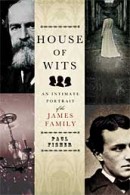 I believe in revisiting older books around here, so why not older reviews? This one’s not even that old. Last fall, the Claremont Review of Books published Cheryl Miller’s take on House of Wits: An Intimate Portrait of the James Family
I believe in revisiting older books around here, so why not older reviews? This one’s not even that old. Last fall, the Claremont Review of Books published Cheryl Miller’s take on House of Wits: An Intimate Portrait of the James Family by Paul Fisher. I’m a fervid William James fan, so the book caught my eye when it was published. Miller has dampened my eagerness to read it by discussing its approach in the larger context of biographical trends:
The pathographer sees himself as deconstructing myths, refusing, as Fisher puts it, to let the success of great men “obscur[e] the real complexity of famous lives.” Instead, the pathographer promises to expose great men for the “bad little fictions” they really are. Yet, as bold and iconoclastic as the pathographer thinks he is, he is actually in thrall to a much more powerful, enduring mythology: the myth of the tortured artist or the dysfunctional genius.
I recommend reading the whole thing.
(Via Arts & Letters Daily)
Tuesday, May 5th, 2009
The Beat
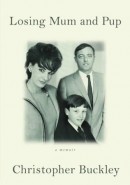 Notable reviews that have recently run elsewhere:
Notable reviews that have recently run elsewhere:
Thomas Mallon on Christopher Buckley’s memoir about his famous, recently deceased parents. . . . Michael Ybarra calls Alec Wilkinson’s biography of Pete Seeger, who recently celebrated his 90th birthday, “a slight, lionizing and ultimately unsatisfying book” that lets the protest singer off the hook too easily. . . . The New Republic collects several reviews written by and about Nabokov for the magazine. . . . David Horspool considers a new biography of Tom Waits, “more a meditation on Waits’s work than his life.” . . . George Eaton reviews Voodoo Histories, David Aaronovitch’s analysis of conspiracy theories, the “one guaranteed growth industry” even in tough economic times. . . . Judith Thurman reviews a “serious academic reconsideration” of Helen Gurley Brown, the longtime editor of Cosmopolitan. . . . Jane Ciabattari admires Colson Whitehead’s latest.
Monday, May 4th, 2009
Song of My Beard
I found this at Readerville, which rightly prefaced it with, “Some things defy introduction or summarization; you simply have to see/read them for yourselves.” Such is the case with this, which left me confused, entertained, and then confused again: Poets Ranked by Beard Weight.
Monday, May 4th, 2009
National Dumbing Down Continues Apace
 Researching the most recent installment of The Cherry & the Pit (below), I came across this recently acquired book:
Researching the most recent installment of The Cherry & the Pit (below), I came across this recently acquired book:
Janet Mullany’s THE IMMORTAL JANE AUSTEN, a humorous novel about Jane Austen in Regency England who joins the vampire resistance in Bath when England is invaded by French forces.
This is on the heels of the bestselling Pride and Prejudice and Zombies, which, as the cover copy charmingly puts it, “transforms a masterpiece of world literature into something you’d actually want to read.”
The author of that book, Seth Grahame-Smith, has been signed to write a novel about Abraham Lincoln that re-imagines the 16th president as a vampire slayer. Don’t worry, though; Grahame-Smith’s editor reassures us that “. . . rather than just toss vampires in wherever he feels, Seth is doing a lot of research to see where they could fit in properly to the actual events of Lincoln’s life.” Whew. I’d hate to read something that turns Lincoln into a vampire slayer in some slapped-together, unrealistic way.
News of the first Jane Austen-zombie mash-up didn’t bother me too much. I’m pretty irreverent, and there’s comedic potential there. But of course, the book publishing industry, in its unending quest to become Hollywood without the profits, will now ride this idea into the deep, cold ground.
Monday, May 4th, 2009
The Cherry & the Pit
A continuing series that highlights books recently acquired for future publication. Each post features a book we’re looking forward to, and a book we’re . . . not.
The Cherry:
Jeffrey Meyers’ JOHN HUSTON, a biography of the acclaimed and charismatic director of The Maltese Falcon, The Treasure of Sierra Madre, and The Misfits among others, detailing his colorful, Hemingway-esque life.
The Pit:
Daryn Kagan’s TRIPOD, the true story of a wise 3-legged cat named Tripod and his life lessons.
Friday, May 1st, 2009
Signs of Life
My travels have slowed the site this week, but a few posts will go up this afternoon, including a review in Circulating. I have many fine contributors around here, but behind the curtain (under the hood, or whatever cliché you prefer), it’s just me. A more regular flow will resume soon.

